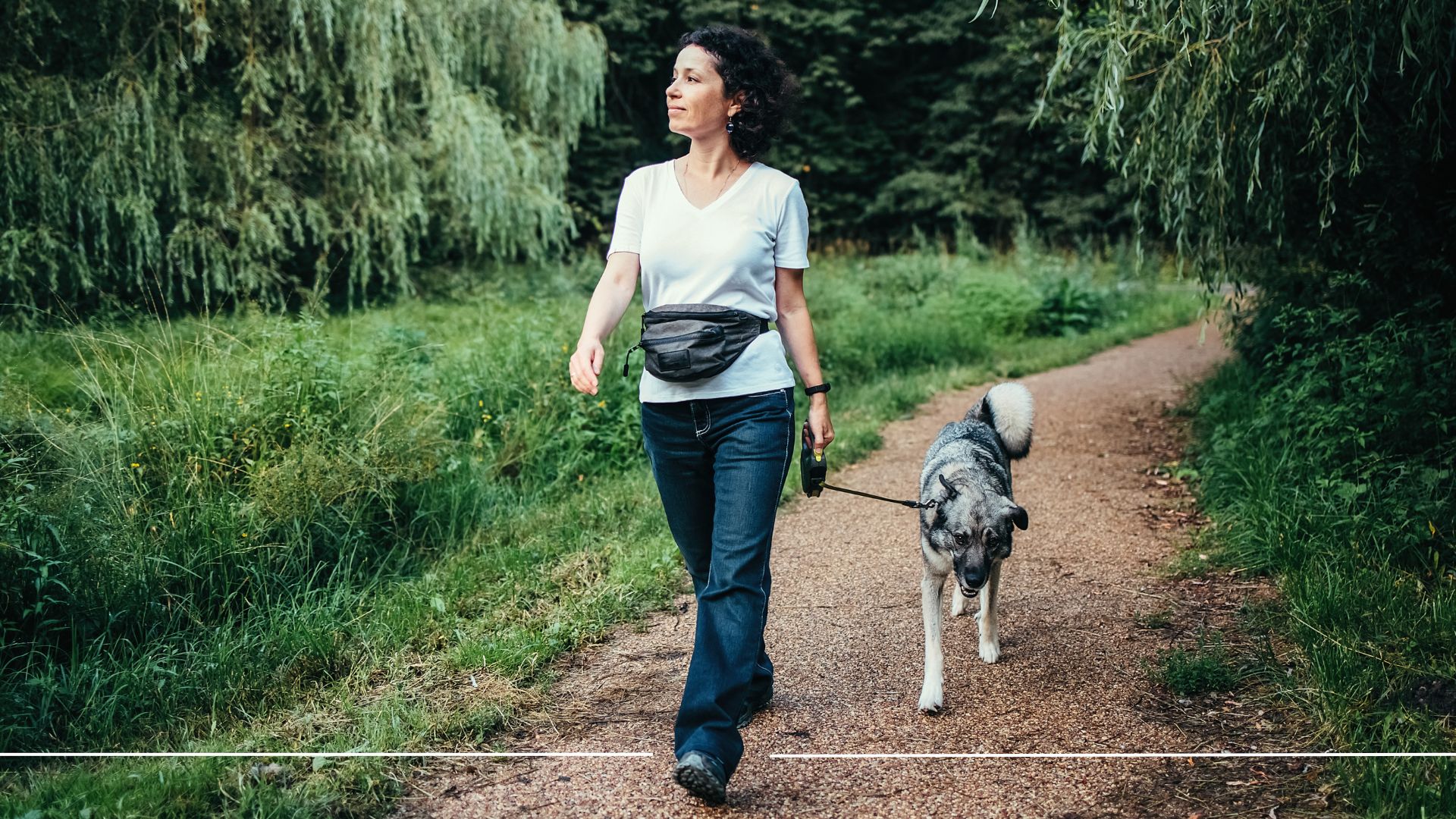
Walking might have a lower impact and be easier on the body than sports like running, but there are still so many benefits to the activity.
Whether it's pulling on your pick of the best walking shoes to go for a lunchtime spin every day or taking a weekend a month to go hiking, you can boost your cardiovascular fitness, metabolic health, and mental wellbeing by stepping outdoors.
The good news is, you also don't even need to get 10,000 steps in to reap these benefits. “A study by Brigham and Women's Hospital found that women who averaged at least 4,400 steps a day had a significantly reduced mortality rate compared to women who only took 2,700 steps. As the number of steps increased, the mortality rate reduced, up to 7,500 steps," says Dr Vikash Sharma, an orthopaedic clinical specialist.
As the doctor says, the more you do, the more benefits you'll reap. The same goes for speed - slow walking has advantages, but if you pick up the pace, you'll see even bigger changes to your cardiovascular fitness and general health.
Ready to go? Here, woman&home speaks to the experts and digs deep into the science to reveal the key benefits of walking, to inspire you to get outdoors or work towards 10,000 steps at home.
Benefits of walking
1. Helps fight off major diseases
Walking has been proven to be one of the best exercises for longevity, meaning it can help us live longer, but also healthier.
A large review, published in the GeroScience Journal, looked at many studies on walking and found that evidence "overwhelmingly" supports the activity as a "powerful anti-ageing" tool.
It reduces the risk of cardiovascular disease, high blood pressure, type 2 diabetes, and cancer, and it was found to improve some musculoskeletal disorders, help people sleep better, and promote resilience, all of which contribute to a long and healthy life.
To get these benefits, the researchers suggest a brisk walk for at least 30 minutes, five days a week, which matches NHS exercise guidelines.
2. Helps you sleep better
Any exercise can help improve your sleep, with a study in the Cureus Journal of Medical Science showing that regular physical activity improves sleep quality, reduces the time it takes to fall asleep, and improves overall sleep quality.
The review found that regular, moderate-intensity exercise is "most effective" for sleep, and brisk walking fits into this category. Moderate intensity activity is movement where you feel a little out of breath, but you can still hold a conversation.
Higher-intensity activities like running or lifting weights may not have the same effect, as the review also found that activities like these can make sleep harder to come by if they are done later in the evening.
3. Boosts bone strength
Running, walking, strength training, and any other exercise that puts pressure on your bones and joints is good for bone health. "Bone is living tissue. It grows stronger with the force of our muscles pulling against it," says Professor Craig Sale, professor of human physiology at Nottingham Trent University.
“If you are looking to build up your bone density, you will need to increase the impact on joints and bones to stimulate change and new bone cells to grow,” adds Dr Sharma, and walking does just this.
It doesn't matter if you like to walk outdoors or do a treadmill workout on your walking pad at home as well - you can reap this benefit either way.

4. Can help with weight loss
Not everyone wants or needs to lose weight, and no one should be pressured to do so. But if you want to lose weight sustainably and healthily, you can certainly walk for weight loss.
"Walking is often called one of the best exercises for weight loss because it’s sustainable and consistent, and in weight loss, consistency always wins," says Eryn Barber, a certified personal trainer working with The Fitness Group. "While it doesn’t burn calories as rapidly as high-intensity workouts, it can be done more frequently and for longer durations, which adds up significantly over time."
It also has significant mental health benefits, which play a role in weight loss. "It's less likely to lead to burnout, and walking helps regulate mood and reduce stress, both of which are major factors in emotional eating and sticking with a healthy routine," she says.
In the debate of walking vs running, running burns calories more efficiently, but walking will still burn the same number over a longer period, with less impact on your bones and joints.
5. Eases symptoms of menopause
Walking could reduce the severity of some symptoms of menopause, particularly those linked to stress, anxiety, and depression.
A study by Temple University found that 40 minutes of walking five times a week was the point at which the benefit kicked in, but this doesn't have to be done all at once. You can spread the steps out through the day, an idea known as exercise snacking.
Other studies, including one by the Medical University of Silesia, have found that walking can reduce the negative physical symptoms of menopause, too. The researchers of this study found that women who exercised had fewer severe symptoms, ranging from hot flashes to vaginal dryness, compared to inactive women.
6. Walking is a natural mood booster
"Walking can most definitely improve your mood," says Dr Sharma. "Studies have shown that walking can reduce feelings of hostility and anger, and improve your sleep."
Professor Sale agrees. "Modern living sees a lot of stresses in both the workplae and at home, which impacts your mental health. Walking is crucial in helping you overcome these pressures, giving you fresh air and clearing your mind," he says.
When researchers from the Boston University School of Medicine asked people with depression to walk for 30 minutes three times a week for 16 weeks, they found it had similar mood-boosting effects to antidepressant medication.
The research is there, and the benefits of walking for stress reduction are clear, but no exercise is a replacement for adequate mental health assistance. Always speak to your doctor.

7. Boosts brain power
Research from Parthenope University of Naples shows that walking wakes the brain up, improving concentration and boosting cognitive health by firing up the neurons and promoting cell growth.
It also releases more endorphins into the body, which helps reduce stress and makes us feel euphoric, meaning we're more likely to be able to concentrate better, complete tasks to a higher quality, and maintain focus for longer. Win!
If you're walking outside in green space, you'll also reap the benefits of the great outdoors. Researchers at Boston, Harvard, and Rush Universities looked at data from over 13,500 women, aged 61 on average, and found that those living in areas with more green space had higher scores on thinking speed, attention, and overall cognitive function, reducing their biological age by 1.2 years.
8. Helps maintain a healthy immune system
One way to keep colds and flu at bay is to head outside for a walk. In a study published in the British Journal of Sports Medicine, researchers found that in the group of participants, those who walked at least 20 minutes a day for five days a week had almost half the sick days as those who worked out once a week or less. They were also off sick for a shorter amount of time, with milder symptoms.
A similar study in BMC Public Health found that the chances of getting a cold were reduced by 26% among adults who walked three times a week.
There's no guarantee this was exclusively down to walking - those who regularly exercise are likely to have other healthy habits around nutrition, sleep, and stress, which can feed into how healthy our immune system is. However, it's still a sign to get your steps in.
If you're looking to explore more in your local area, one of the best walking apps may be able to help recommend routes you've never taken before or paths to explore in your city.
9. Easy to fit into your routine
One of the many other benefits of walking versus other activities is how easy it is to do. Many people naturally walk every day. You also don't have to go to the gym, have dumbbells or a yoga mat at home, or really take any time out of your day to reap the rewards of this exercise.
As Barber says, consistency is key, and whether you make it a habit to go for a walk after lunch or take the stairs in the office, every step counts.







